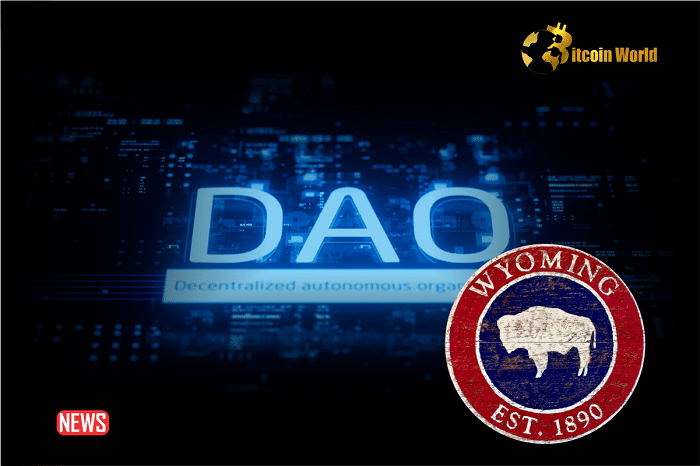In a landmark move for the world of decentralized governance, Wyoming has officially become the first US state to grant legal recognition to Decentralized Autonomous Organizations (DAOs). Think of it as a giant leap for crypto-kind! Governor Mark Gordon recently signed the Wyoming Decentralized Unincorporated Nonprofit Association Act, affectionately known as DUNA, into law. This isn’t just a minor update; it’s a game-changer that could redefine how DAOs operate within the legal landscape.
What Exactly are DAOs Anyway?
For those still wrapping their heads around the concept, DAOs are essentially internet-native communities with a shared mission. Imagine a group of people from all corners of the globe, collaborating and making decisions together online. What makes DAOs unique is their management style – typically governed by code and executed through smart contracts on a blockchain. This means decisions are transparent, automated, and, crucially, decentralized, removing the traditional hierarchical structures we’re used to.
However, this very decentralized nature has been a double-edged sword. While it’s a core strength, it has also presented headaches for regulators. In fact, the Commodity Futures Trading Commission (CFTC) successfully took legal action against a DAO in 2023, highlighting the regulatory grey area they often operate in. This lack of clear legal standing has been a significant hurdle for DAOs seeking to engage with the traditional financial and legal systems.
See Also: South Korea To Launch Virtual Asset Tracking System For Tax Transparency
Wyoming’s DUNA Act: A New Dawn for DAOs?
This is where Wyoming steps in to potentially rewrite the rulebook. The DUNA Act is designed to grant DAOs something they’ve desperately needed: legal existence. But what does this actually mean in practical terms? Let’s break it down:
- Entering Contracts: DAOs can now legally sign contracts, just like any traditional business. This opens doors for partnerships, service agreements, and much more, all with legal enforceability.
- Opening Bank Accounts: No more banking limbo! Legal recognition allows DAOs to open bank accounts in their own name, streamlining financial management and operations.
- Appearing in Court: Whether it’s to defend their interests or pursue legal action, DAOs can now represent themselves in court, ensuring they have the same legal recourse as other entities.
- Paying Taxes: Clarity on tax obligations is crucial for any legitimate organization. The DUNA Act provides a framework for DAOs to pay taxes, bringing them into the formal economic system.
Crucially, and this is a key aspect highlighted by experts, the DUNA Act achieves all of this without meddling with the internal, decentralized DNA of DAOs. It’s about providing a legal wrapper that respects their unique structure and operations, rather than forcing them into a traditional corporate mold.
Why is This a Big Deal? The Experts Weigh In
The crypto community is buzzing with excitement, and rightly so! This new law is widely seen as a major victory for DAOs, which have been navigating a maze of regulatory uncertainty for years. Miles Jennings, a respected voice in the crypto legal space and general counsel for a16z crypto, summed it up perfectly. He praised the legislation, emphasizing its power to “enable blockchain projects to operate within the bounds of applicable laws without compromising their decentralization.”
Wyoming just passed the first law in the US recognizing decentralized autonomous organizations (DAOs). This is a big deal because it will enable blockchain projects to operate within the bounds of applicable laws without compromising their decentralization. https://t.co/erC9rZf8eP
— Miles Jennings (@milesjennings) March 8, 2024
Looking Ahead: What’s Next for DAOs and Legal Recognition?
Wyoming’s pioneering move could set a precedent for other US states and even countries around the world. It demonstrates that it’s possible to create a legal framework that accommodates the innovative nature of DAOs without stifling their core principles. While questions and details will undoubtedly emerge as DAOs begin to operate under this new law, the DUNA Act represents a significant step forward.
For DAOs, this means increased legitimacy, reduced operational friction, and a clearer path to mainstream adoption. For the broader crypto space, it signals a growing understanding and acceptance of decentralized technologies by lawmakers. Keep an eye on Wyoming – they might just be charting the course for the future of decentralized organizations!
#Binance #WRITE2EARN
Disclaimer: The information provided is not trading advice, Bitcoinworld.co.in holds no liability for any investments made based on the information provided on this page. We strongly recommend independent research and/or consultation with a qualified professional before making any investment decisions.


